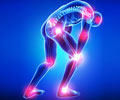
‘The Ageing-On research group developed a programme to improve the life quality of elderly people who are in residential care.’
Tweet it Now
Strength, balance and stamina are worked on. The programme is run progressively and the intensities are increased as the capabilities of the people, for whom the adaptations of the body are greater, increase. This makes it pioneering because firstly there are few studies exploring the effects of physical exercise on frailty in this population, and secondly, the programmes do not tend to be adapted to the capabilities of the each individual. The effectiveness of the programme was analysed in a sample of 112 participants from 10 centres for the elderly. They were randomly divided into two groups: the "control" group that continued with its usual activities and care, and the "experimental" group that did two 45-minute sessions of physical exercise per week designed to improve strength and balance. The time they spent walking was gradually increased until they reached at least 20 minutes a day.
Physical and cognitive improvement
By the first assessments a link was found between greater limb strength, an improved cognitive state and enhanced life quality. In other words, the work designed to build strength, which is often overlooked in elderly people, can be of great help in improving their physical and mental state, in particular among those who use walking sticks, crutches, Zimmer frames or other aids.
After three months, the study showed a significant improvement in most of the physical variables, such as strength, walking speed and balance in the people who were doing physical exercise. By contrast, the people in the "control" group saw a reduction in their physical capabilities.
Advertisement
The positive results obtained have been published in the journals BMC Geriatrics, Maturitas and Experimental Gerontology. The Ageing-On research group has also designed a methodology whereby any centre for the elderly can set up an exercise programme developed with the guidelines set out in its research.
Advertisement
Source-Eurekalert














